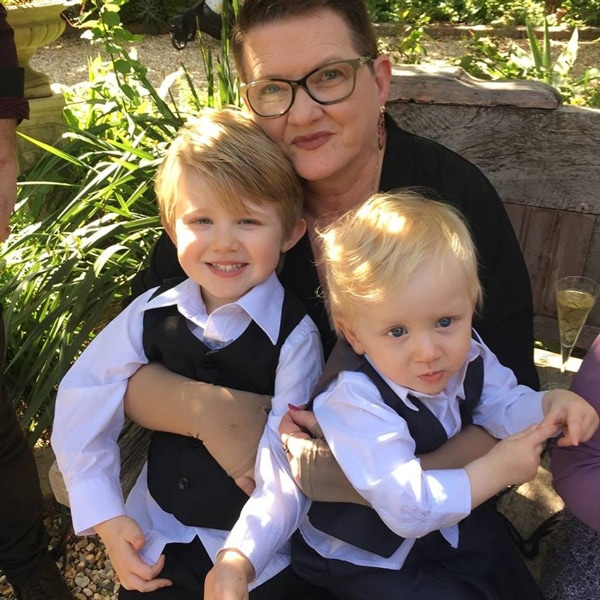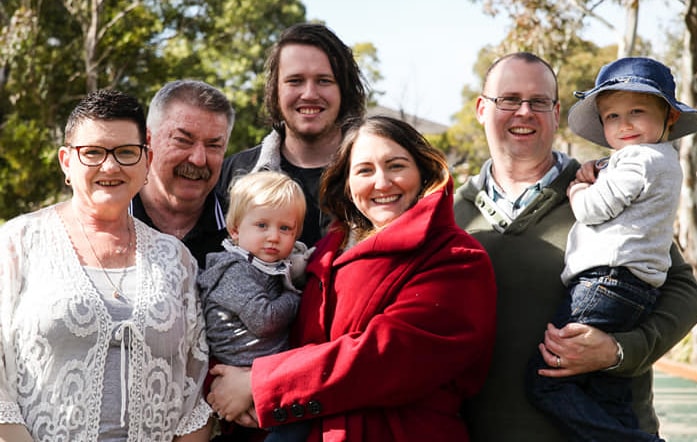
Tracey with her grandchildren
Tracey was diagnosed with breast cancer in 2010 at the age of 47. She had multiple surgeries, including a double mastectomy, and chemotherapy to treat the cancer. Years later, she found out it had spread to her spine, ribs, liver and right lung.
Tracey refuses to let her diagnosis get in the way of her making the most out of her life. To date, she has climbed Sydney Harbour Bridge, spent Christmas and New Year’s Eve in Northern Ireland with family, swam with dolphins, saw her daughter get married and was also there for the birth of her grandsons.
She cherishes every moment with her family and has been a pillar of support for her son Leigh, who was born with a chronic bowel disease. Tracey hopes that with continued breast cancer research there will be more treatment options for those diagnosed with advanced breast cancer. Read her letter below.
Congratulations, Tracey! If you’re reading this, we’ve made it to 2030!
2020 wasn’t a great time, was it? Things were pretty frightening. Despite resisting ‘the boyfriend’ (cancer) for 10 years, we were getting worse; in more pain, more tired than ever; and ‘he’ was spreading.
I remember people telling us how inspirational we were, that we were a fighter, and how brave we were. They told us they were inspired by our ‘journey’. Sure, people meant well, but we wanted to scream when we heard that word. We didn’t feel brave; we were scared and feel cheated of the life we should have had left. Our family has a history of longevity, but we looked like missing out.
The treatments and operations we had along the way were horrendous, weren’t they? Having our breasts cut off was life-changing – and not in a good way. Chemo was horrible because you know how crap our veins are. We lost our hair more than once.
When we got sick, we joined and ran support groups and even started a charity to help women financially. Consequently, we’ve seen beautiful, fierce, fabulous women, some who became our closest friends – pass too soon. That added to the fear and frustration at the utter unfairness of it all. And don’t get me started on how it’s affected our family – and some of our friends, who stepped back because they couldn’t handle it up close. But guess what? We’re still here!
Being able to help others by words and example helped us cope with it, to an extent. We managed to be around for Erin’s wedding and the birth of both our beautiful grandsons. Remember how the oncologist told us we wouldn’t be around to see any of that? She was wrong – we’re still here. Whatever life we have left we’re living and refusing to simply wait to die.
It’s made us tougher and more resilient, hasn’t it? Sure, we’ve sometimes been intolerant of those who complain about the little things – ‘first-world problems’. In the same vein, we learned not to ‘sweat the small stuff’ either. We became able to meaningfully empathise with other women in our position, because of our experiences. We were simply in a better place to help. We became an educator of sorts, telling whomever will listen to conduct regular BSE (breast self-exams); to not delay in consulting a doctor if they find a lump – and so on.
We became an ambassador for the National Breast Cancer Foundation (NBCF) to make a difference. We spoke to people and groups, so they’d donate to NBCF to enable their work to continue. We got involved in other support groups to help and encourage other women – especially younger ones – to deal with what they’re facing. That’s because we believed breast cancer could be beaten. I believe that’s why we’re still here – because where there’s life there’s hope.
And that was just us. More people must have got involved and spread the message even more widely, generated more donations, which would have created a better chance of making an impact; enhancing early detection, quicker and better treatment and, ultimately, fewer wives, mothers, daughters, and sisters being lost to us.
And this is why you’re actually reading this letter in 2030 – because we’re still here. Thanks to research, you have been able to be here for the life you so wonderfully deserve.
Keep up the good work, hun.
With love, Tracey.
